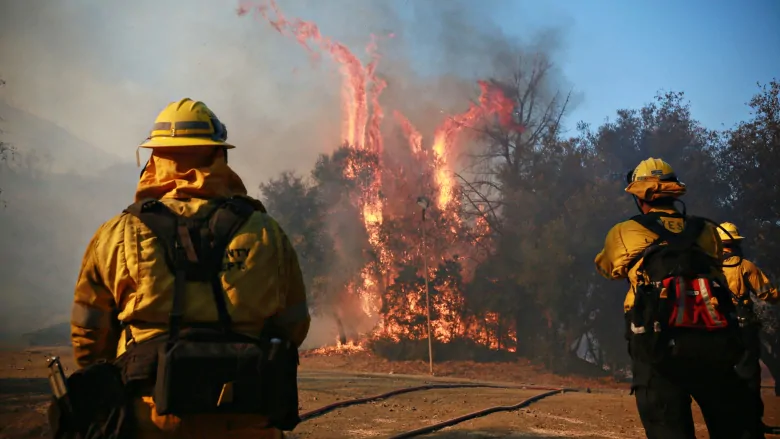'We’re doing the dirty work, the hardest work, the work nobody wants to do'
Of all the fires stalking California right now, the one that destroyed the city of Paradise is the worst.
The Camp Fire, north of Sacramento in the state's interior, is the deadliest and most destructive in California's history. Winds whipped the blaze through dry forests where the heat became so intense it melted the rims of abandoned cars.
South of the state capitol, fires are clustered around Los Angeles and San Francisco.
At each site, crews struggle to bring the deadly blazes under control. The work is dangerous and highly specialized and the conditions are volatile. There are about 10,000 firefighters on the ground now and they work side by side with state inmates.
Two thousand incarcerated people — 58 of them juveniles — are among those labouring to put out California's fires.
Amika Mota was once one of them.
"I loved the work," Mota told Day 6.
In 2009, Mota was sentenced to just under 10 years in a California prison for striking and killing a person while driving under the influence of drugs. Four years into her time served, she volunteered for the state's Conservation (Fire) Camp program.
When she was accepted, it changed everything.
'I felt like I had some value'
"I think that it was the first time in that stretch of time I had been incarcerated where I felt like I had some value in the world," she said.
"You know, I had been sitting in a cell for four plus years at that point," Mota recalled.
Outside the prison gates for the first time since her incarceration, Mota tore into the work.
"I'll never forget that first trip in a fire engine to my first call", she said.
She and her crew learned how quickly conditions at a California fire can deteriorate and become deadly. Mota remembers a large grass fire that got out of control.
"We had hoses kind of dragged out across the ravine and the fire jumped that ravine and our hoses were burned up. Our hoses are the only protection that is offered between us and the fire," Mota said.
"There were definitely some experiences where we knew that our lives were in danger."
Mota spent about two and a half years fighting fires, but then she was paroled and her firefighting days ended.
She says she would have pursued a job in her municipal fire department, but that door is closed to people with a criminal record, despite their experience and training.
Once their sentence is served, firefighting inmates find few jobs fighting fires.
"We have a state that is set up to rely on this kind of labour and be okay and comfortable using it when people are inside," Katherine Katcher told Day 6.
Katcher is founder of Root & Rebound, an organization that advocates for former inmates. She says California's EMT licensing boards are discriminating against firefighters trained while incarcerated.
"It leads to people who've been serving their sentences and giving their lives to the state of California. It leaves them homeless and jobless when they get out," Katcher said.
"It's highly problematic."
53 cents an hour
Katcher has other issues with the program. In Mota's firefighting training she achieved the rank of engineer.
It is "the highest paid position in the fire department," she said. Her salary, though, was 53 cents an hour.
"My total cheque was about $60 a month," Mota said.
The California Department of Corrections and Rehabilitation says fire camp inmate firefighters earn an average of $2 per day, and an additional $1 per hour when assigned to an active fire.
Katcher says the state is incentivizing the program not with wages, but with a reduction in time served.
"They are essentially paid with freedom," Kutcher said. "Depending on the sentence people either receive 50% off of their sentence or up to 66.6% off of their sentence for fighting fires while incarcerated."
The incentive could force an inmate's decision to volunteer for a program that gets more dangerous as the intensity of California's fires grows.
"This program of having California inmates fight California fires has been going on for decades and over the last two years there have been both first prisoners killed and also prisoners injured in the line of duty," Katcher said.
"This program is certainly ethically dubious at best."
Amika Mota knows California is leaning hard on the expertise of their professional firefighters today.
"I have a huge heart for the firefighters out there right now," she said.
'Doing the dirty work'
"I think it's really easy … to place a prison labour force at the front lines of a fire. You know, we're doing the dirty work, we're doing the hardest of the work that nobody wants to do," Mota said.
"I hope that their work is lifted up and honoured and I hope that at some point our system will consider properly paying our folks," she added.
Mota is glad her days of doing that work for 53 cents an hour are over.
"I don't wish that I was an incarcerated firefighter again."

